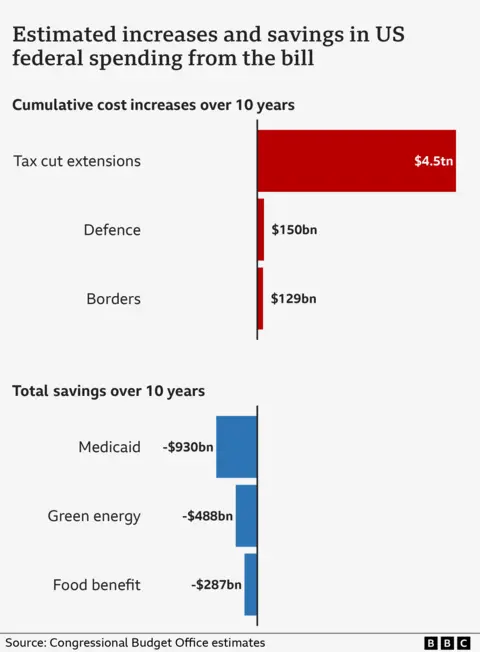Brandon Drenon and Nadine Yousif
BBC News, Washington DC
Watch: First comments from Trump since his megabill passed
US President Donald Trump's budget mega-bill is set to become law after it passed a final vote in the House of Representatives.
The president is now poised to sign the bill into law during a ceremony on Friday.
Its advancement has not been easy. The legislation has stoked disputes among lawmakers from Trump's own Republican Party, who control both chambers of Congress, over social programmes and spending levels.
The Congressional Budget Office estimates the bill could add $3.3tn to federal deficits over the next 10 years and leave millions without health coverage - a forecast that the White House disputes.
During a vote in the US Senate earlier this week, Vice-President JD Vance was forced to cast the tie-breaking vote in order to pass the bill.
The legislation's prospects in the House appeared precarious, however Republican rebels eventually got on board to support it following hours of wrangling on Thursday.
Here is a look at some of the key items and hotly-debated issues in the bill.
Extension of 2017 Trump tax cuts
During his first term, Trump had signed the Tax Cuts and Jobs Act, which lowered taxes for corporations and for individuals across most income brackets.
Trump had touted the law as one that would stimulate economic growth, but experts have argued that it has benefited wealthy Americans the most.
Key provisions of that law are set to expire in December, but the sprawling budget bill currently before lawmakers aims to make those tax cuts permanent. It also increases standard deductions by $1,000 (£736) for individuals and $2,000 for married couples until 2028.
Steep cuts to Medicaid
To help finance tax cuts elsewhere, Republicans have added additional restrictions to Medicaid, the healthcare programme relied upon by millions of disabled and low-income Americans.
One of the changes is a new work requirement for childless adults without disabilities. Another change to Medicaid is shifting re-enrolment from once a year to every six months, and adding income and residency verifications.
There are also lower provider taxes - which states use to help fund their share of Medicaid costs - from 6% to 3.5% by 2032.
Complaints from some Republicans in states that draw funding from these taxes, especially for rural hospitals, led the Senate to delay the cuts and add a $50bn rural hospital fund.
The Senate bill also proposes tightening eligibility requirements so that able-bodied adults with children aged 15 and over would need to work or volunteer at least 80 hours a month.
The Senate Medicaid work requirement is said to be the strictest ever proposed by Republicans, raising the odds that large numbers of Americans could lose medical coverage as they will not keep up with the new paperwork.
The Congressional Budget Office estimates that nearly 12 million Americans could lose their health coverage by the end of the next decade as a result of these changes.
Social Security taxes
On the campaign trail, Trump vowed to eliminate taxes on Social Security income - monthly payments to Americans of retirement age and people with disabilities.
The House bill fell short of delivering on that promise, but it did temporarily increase the standard deduction of up to $4,000 for individuals 65 and over. That deduction would be in place from 2025-28.
Senate Republicans approved an extension of Social Security tax breaks and an increase that would grant a $6,000 tax deduction for older Americans who earn no more than $75,000 a year.
Increasing state and local tax deduction (Salt)
The bill increases the deduction limit for state and local taxes (Salt).
There is currently a $10,000 cap on how much taxpayers can deduct from the amount they owe in federal taxes. That expires this year.
The Senate's approved bill raises it from $10,000 to $40,000 - but after five years, it would return to $10,000.
Salt taxes were a big sticking point in the House, especially Republican holdouts in some Democratic-controlled urban areas. The House's version of the spending bill did not include a five-year limit, so the Senate's changes could pose a problem for some House Republicans.
Cuts to food benefits
Reforms have also been added to the Supplemental Nutrition Assistance Program (Snap), which is used by over 40 million low-income Americans.
The Senate bill requires states to contribute more to the programme, which is currently fully funded by the federal government.
The government would continue to fully fund the benefits for states that have an error payment rate below 6%, but states with higher error rates would be on the hook for anywhere from 5% to 15% of the programme's costs.
The change would start in 2028.
The Senate bill also adds work requirements for able-bodied Snap enrollees who do not have dependents.
Boost to defence and border spending
The US military will receive a budget increase of $150bn under the bill.
The money will be used to bolster the armed forces' shipbuilding capacity, as well as to fund Trump's "Golden Dome" missile defence project.
It will also significantly increase funding for immigration enforcement by allocating $100bn to Immigration and Customs Enforcement (ICE), the agency central to the Trump administration's efforts to crack down on illegal immigration in the US.
The additional funding, which will run until 2029, will be used to nearly double migrant detention capacity in the US and hire more enforcement personnel.
Prior to the bill, the existing annual budget for ICE was about $8bn. The funding boost now makes ICE the largest federal law enforcement agency, according to the non-profit Brennan Center for Justice.
No tax on overtime or tips and other elements
The "no tax on tips" provision in the budget bill would mark a win for one of Trump's promises during the campaign.
The Senate bill being considered by the House would allow individuals to deduct a certain amount of tip wages and overtime from their taxes. However, they propose gradually phasing out those benefits based on annual income, starting at $150,000 for individuals and $300,000 for joint filers.
It would expire in 2028.
The Senate legislation would also permanently increase a child tax credit to $2,200 - which is $300 less than what House lawmakers had eyed. The House version required both parents have a Social Security number, but the Senate OK'd a requirement of only one parent.
The upper chamber's bill also proposes raising the debt ceiling by $5tn - more than the $4tn approved by the House last month. The debt ceiling is the limit on the amount of money the US government can borrow to pay its bills.
Lifting the debt limit allows the government to pay for programmes already approved by Congress.
Clean energy incentives reduction
One of the most notable divisions between House and Senate Republicans is the Senate's proposal for clean energy tax breaks.
Although both call for an end to the Biden-era federal clean energy tax credits, Senate Republicans approved phasing them out more slowly.
For instance, the Senate has extended the runway for businesses that build wind and solar farms to still benefit from the tax credits. However, both the House and Senate version seek to deny the credits to companies whose supply chains may have ties to a "foreign entity of concern", such China.
Companies that begin construction this year could qualify for the full tax break. That drops to 60% if they begin construction in 2026 and 20% if they begin in 2027. The credit would disappear in 2028.
The House version of the bill sought to end the tax breaks for those companies almost immediately.


What happens next?
Now that the bill has passed the House, its next stop is the president's desk to be officially signed into law.
The White House says President Trump will sign it at a ceremony on 4 July at 17:00 EDT (22:00 BTS).
White House press secretary Karoline Leavitt reacted to the bill's passing with a one word message on social media. "VICTORY!" she said, alongside an American flag image.









 English (US) ·
English (US) ·